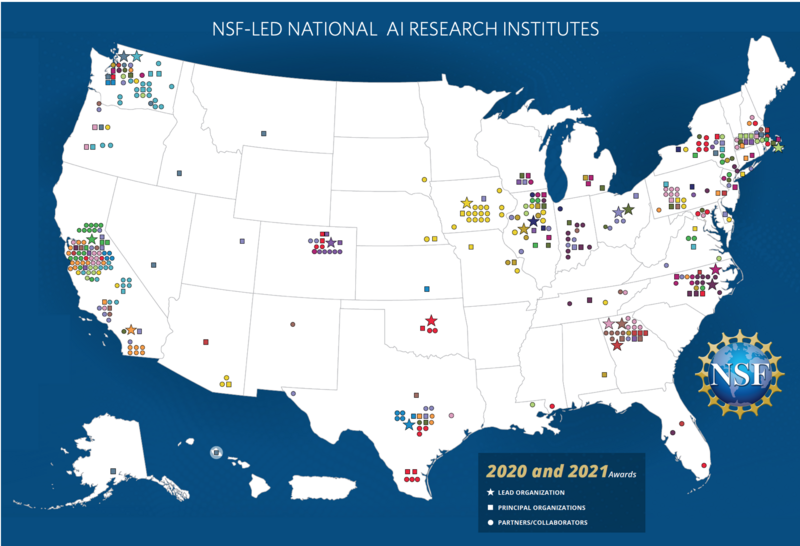July 29, 2021
NSF investing $20 million in Georgia-led effort to transform online education for adults
Project centers on artificial intelligence; new National Institute in AI to be headquartered at Georgia Tech

The National Science Foundation announced today that it is investing $20 million in a collaborative effort to leverage artificial intelligence to transform adult learning in STEM fields.
Led by the Georgia Research Alliance, the effort unites experts in computer science, artificial intelligence (AI), cognitive science, learning science and education from Arizona State University, Boeing, Drexel University, Georgia Institute of Technology, Georgia State University, Harvard University, IBM, IMS Global, Technical College System of Georgia, University of North Carolina at Greensboro and Wiley.
The NSF grant will establish the NSF AI Institute for Adult Learning and Online Education (ALOE) to be headquartered at Georgia Tech, one of 11 NSF AI research institutes announced today.
The ALOE Institute will develop new AI theories and techniques as well as new models of lifelong learning, and evaluate their effectiveness at Georgia Tech, Georgia State, multiple colleges within the Technical College System of Georgia (TCSG), as well as with corporate partners IBM, Boeing and Wiley. The multinational company Accenture joins NSF as a funding partner of ALOE.
“Online education for adults has enormous implications for tomorrow’s workforce,” says project’s Principal Investigator Myk Garn, a GRA Senior Advisor and Assistant Vice Chancellor for New Models of Learning at the University System of Georgia. “Yet, serious questions remain about the quality of online learning and how best to teach adults online. Artificial intelligence offers a powerful technology for dramatically improving the quality of online learning and adult education.”
“The goal of ALOE is to develop new artificial intelligence theories and techniques to make online education for adults at least as effective as in-person education in STEM fields,” says Co-PI Ashok Goel, Professor of Computer Science and Human-Centered Computing and the Chief Scientist with the Center for 21stCentury Universities at Georgia Tech, who will be Executive Director of the ALOE Institute. “ALOE will develop new types of trainable virtual assistants, novel AI techniques to personalize learning at an unprecedented scale, and AI systems to support both learners and teachers.”
Online education massively expanded during the COVID-19 pandemic, and it is likely to stay as a major medium for lifelong learning for many adults. Research and development at ALOE aims to blend online educational resources and courses to make education more widely available, as well as use virtual assistants to make it more affordable and achievable. According to Goel, ALOE will make fundamental advances in personalization at scale, machine teaching, mutual theory of mind and responsible AI.
“All of these add up to making online education more accessible and equitable,” says Chris Dede, Timothy E. Wirth Professor in Learning Technologies at Harvard University and a Co-PI on the project. “Providing all adults with continuous lifelong learning is an urgent priority. Small-scale projects will not combine to create a coherent, scalable model, massive infrastructures from corporations lack depth in cognitive and learning sciences, and few institutions use an evidence-based, data-driven approach to designing online education.”
“In today’s workforce environment, it is imperative for students to obtain skill sets in science, technology, engineering and mathematics to remain competitive,” says Steven Ferguson, Chief Information Officer at the Technical College System of Georgia and a senior member of the ALOE team. “By leveraging both current and emerging artificial intelligence, ALOE will optimize online education to facilitate student success in these areas.”
The ALOE Institute represents a powerful consortium of several universities (Arizona State, Drexel, Georgia Tech, Georgia State, Harvard, UNC-Greensboro); technical colleges in TCSG; major industrial partners (Boeing, IBM and Wiley); and non-profit organizations (GRA and IMS). These various partners will combine their expertise and efforts to advance AI technology to scale and improve education.
The Georgia Research Alliance will coordinate the entities and administer the grant over five years. “Having an enterprise like GRA proved to be beneficial in landing this important Georgia-led grant,” says GRA President Susan Shows.
GRA helps Georgia’s university scientists do more research and start more companies. By expanding research and entrepreneurship capacity at public and private universities, GRA grows the Georgia economy by driving more investment in the state; developing a high-tech workforce; and strengthening Georgia’s reputation for innovation. For 30 years, GRA has worked in partnership with the University System of Georgia and the Georgia Department of Economic Development to create the companies and jobs of Georgia’s future.
Learn more about the NSF AI Research Institutes by visiting nsf.gov.
